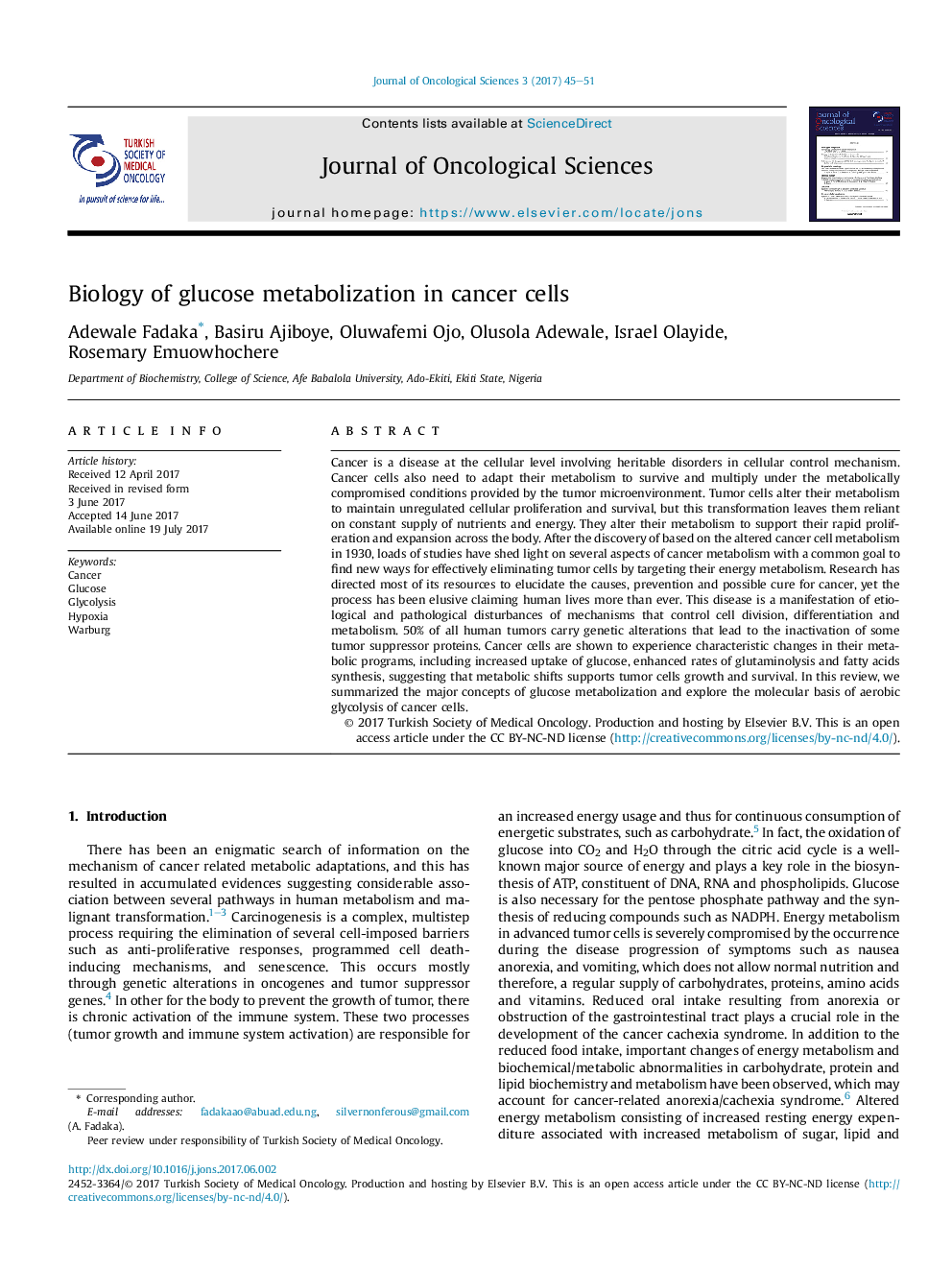| کد مقاله | کد نشریه | سال انتشار | مقاله انگلیسی | نسخه تمام متن |
|---|---|---|---|---|
| 7520660 | 1486861 | 2017 | 7 صفحه PDF | دانلود رایگان |
عنوان انگلیسی مقاله ISI
Biology of glucose metabolization in cancer cells
ترجمه فارسی عنوان
زیست شناسی متابولیسم گلوکز در سلول های سرطانی
دانلود مقاله + سفارش ترجمه
دانلود مقاله ISI انگلیسی
رایگان برای ایرانیان
کلمات کلیدی
سرطان، گلوکز، گلیکولیز، هیپوکسیا، واربورگ،
ترجمه چکیده
سرطان یک بیماری در سطح سلولی است که اختلالات سرطانی را در مکانیزم کنترل سلولی دارد. سلول های سرطانی همچنین نیاز به انطباق متابولیسم خود را دارند تا برای زنده ماندن و ضرب شدن تحت شرایط متابولیکی به خطر بیفتند که توسط میکرو محیط محیط تومور فراهم می شود. سلول های تومور متابولیسم خود را تغییر داده اند تا مانع از تکثیر و بقاء غیرمجاز سلولی شوند، اما این تغییر آنها را در تامین ثابت مواد مغذی و انرژی متوقف می کند. آنها متابولیسم خود را تغییر می دهند تا از گسترش سریع و گسترش آن در سراسر بدن حمایت کنند. پس از کشف بر اساس متابولیسم سلول سرطانی تغییر یافته در سال 1930، بارهای مطالعات در مورد چندین جنبه از متابولیسم سرطان با هدف مشترک برای یافتن راه های جدید برای حذف موثر سلول های توموری با هدف متابولیسم انرژی خود را روشن کردند. تحقیقات بسیاری از منابع خود را برای توضیح علل، پیشگیری و درمان احتمالی سرطان هدایت کرده است، اما این فرایند به سختی ادعا می کند که زندگی انسان بیشتر از همیشه است. این بیماری تظاهر اختلالات علمی و پاتولوژیک مکانیسم هایی است که تقسیم سلولی، تمایز و متابولیسم را کنترل می کند. 50٪ از تمام تومورهای انسان دارای تغییرات ژنتیکی است که منجر به غیر فعال شدن برخی از پروتئین های سرکوب کننده تومور می شود. به نظر می رسد که سلول های سرطانی تغییرات مشخصی در برنامه های متابولیک خود دارند، از جمله افزایش جذب گلوکز، افزایش میزان گلوتامینولیز و سنتز اسیدهای چرب، که نشان می دهد تغییرات متابولیک از رشد سلول های تومور و بقاء حمایت می کند. در این بررسی، ما مفاهیم عمده متابولیسم گلوکز را خلاصه کردیم و مولکولهای گلیکولیز هوازی سلولهای سرطانی را کشف کردیم.
موضوعات مرتبط
علوم زیستی و بیوفناوری
بیوشیمی، ژنتیک و زیست شناسی مولکولی
تحقیقات سرطان
چکیده انگلیسی
Cancer is a disease at the cellular level involving heritable disorders in cellular control mechanism. Cancer cells also need to adapt their metabolism to survive and multiply under the metabolically compromised conditions provided by the tumor microenvironment. Tumor cells alter their metabolism to maintain unregulated cellular proliferation and survival, but this transformation leaves them reliant on constant supply of nutrients and energy. They alter their metabolism to support their rapid proliferation and expansion across the body. After the discovery of based on the altered cancer cell metabolism in 1930, loads of studies have shed light on several aspects of cancer metabolism with a common goal to find new ways for effectively eliminating tumor cells by targeting their energy metabolism. Research has directed most of its resources to elucidate the causes, prevention and possible cure for cancer, yet the process has been elusive claiming human lives more than ever. This disease is a manifestation of etiological and pathological disturbances of mechanisms that control cell division, differentiation and metabolism. 50% of all human tumors carry genetic alterations that lead to the inactivation of some tumor suppressor proteins. Cancer cells are shown to experience characteristic changes in their metabolic programs, including increased uptake of glucose, enhanced rates of glutaminolysis and fatty acids synthesis, suggesting that metabolic shifts supports tumor cells growth and survival. In this review, we summarized the major concepts of glucose metabolization and explore the molecular basis of aerobic glycolysis of cancer cells.
ناشر
Database: Elsevier - ScienceDirect (ساینس دایرکت)
Journal: Journal of Oncological Sciences - Volume 3, Issue 2, July 2017, Pages 45-51
Journal: Journal of Oncological Sciences - Volume 3, Issue 2, July 2017, Pages 45-51
نویسندگان
Adewale Fadaka, Basiru Ajiboye, Oluwafemi Ojo, Olusola Adewale, Israel Olayide, Rosemary Emuowhochere,
